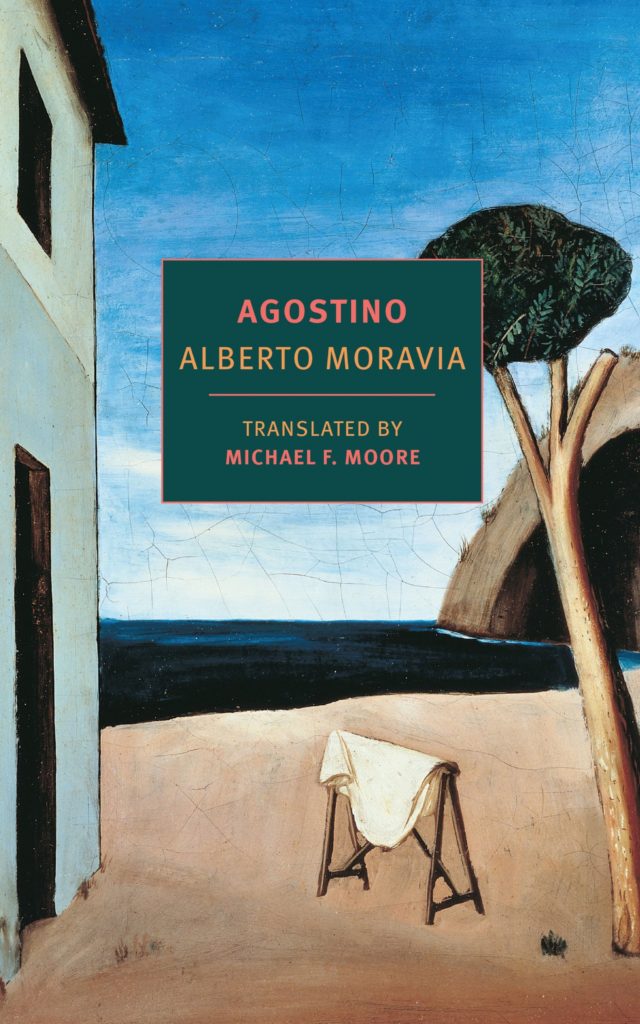
Alberto Moravia was a decorated Italian author whose life, from 1907 to 1990, spanned most of the 20th century. Two consequential events marked him from a young age: his diagnosis, at 9 years old, with tuberculosis of the bone, resulting in a five-year confinement in his bed, and Italy’s decades-long descent into fascism. The first event drove his interest in literature: he read widely and voraciously, picking up French and German along the way; the second resulted in the censorship of his writings in Italy until the end of World War II. I had heard his name in passing, but came across Agostino entirely by accident, and read it on a whim, thinking that its brevity (just over 100 pages) would make it tolerable if I didn’t enjoy it. I burned through it it in a single day, transfixed by Moravia’s deft portrayal of the perils of an unhealthy mother-son relationship.
The titular character, Agostino, is a boy whom we first meet in the company of his young and beautiful mother on an Italian beach, where they have been spending their summer days. The father, we will later learn, passed away, and Agostino is without siblings, accustomed to a total claim on his mother’s attention. From the very first page, we are presented with the dangers of this situation: Agostino cannot abide a male boatman, tasked with rowing them out to sea, so he himself insists on taking the oars, and his mother, for her part, speaks to him “as if he were a man rather than a thirteen-year-old boy.” Day after day, the pattern repeats itself: the mother and son row out to sea and then swim in the ocean, but Moravia describes these scenes using the language of florid romance novels.
Agostino would see the mother’s body plunge into a circle of green bubbles, and he would jump in right after her, ready to follow her anywhere, even to the bottom of the sea. He would dive into the mother’s wake and feel as if even the cold compact water conserved traced of the passage of that beloved body.
Much of the inappropriateness of this relationship exists only in Agostino’s mind, but there are moments where the mother seems equally responsible for his unhealthy obsession, as when she elects to tan naked in the same boat as her son:
Then the mother, who never seemed to tire of the sun, would ask Agostino to row and not turn around: in the meantime she would remove the top of her bathing suit and lower the bottoms to as to expose her whole body to the sunlight. Agostino rowed and felt proud of his assignment, as if it were a ritual in which he was allowed to participate. Not only did he never think of turning around but he felt as if her body, lying there behind him, naked in the sun, was shrouded in a mystery to which he owed the greatest veneration.
We are privy here to a Freudian nightmare, and though it is the inappropriate sexual element we find most revolting, what Moravia is digging at is far more frightening. It is nothing less than the arrested psychological development of Agostino, whose inability to break from his mother’s charms threatens his own maturation into adulthood and autonomy. Writing in the middle of the 20th century, Moravia was familiar with the works of Freud and Jung, so it’s worth quoting this Jungian description of a mother-son dynamic gone wrong:
Often a mother appears beside him who apparently shows not the slightest concern that her little son should become a man, but who, with tireless and self-immolating effort, neglects nothing that might hinder him from growing up and marrying. You now behold the secret conspiracy between mother and son, and how each helps the other to betray life.
Agostino’s mother is not conscious that she is playing this role, but the consequences are dire nonetheless, and both mother and son find some reprieve from this unhealthy dynamic when outsiders break up their routine: a suitor, in the case of Agostino’s mother, and a gang of young boys – tough, lower class kids who had to grow up and discover their independence at an early age – in Agostino’s case.
In examining this extreme case of a corrupted mother-son relationship in such excruciating detail, Moravia sheds light on all mother-son dynamics, and on the complicated and often painful process by which children come to disassociate themselves, psychologically, from their parents and win an identity of their own. It is an astonishingly perceptive novel, punching far above its weight, and the discomfort it causes in its readers will linger on long after the final page is turned.